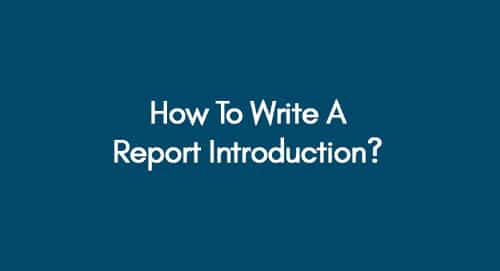
How to Write Data Analysis and Findings: A Comprehensive Guide to Interpreting Result
October 10, 2022
How to Write a Report Introduction: A Step-By-Step Guide
October 12, 2022Self-reflection is crucial for academic success because it allows students to identify their strengths and weaknesses. By reflecting on your performance, you can set goals and create strategies for improvement.
Explore Current Dissertation Topics Here
Review Quality Dissertation Examples Here
The good news is that reflection is a skill that can be learned. Improvement requires time and practice, just like any other skill. But once you get the hang of it, you'll find that self-reflection is valuable for becoming a better writer. This guide will walk you through how to write a self-reflection or reflective writing.
What is Self-Reflection & Reflective Writing?
Self-reflection is the process of thinking about and evaluating one's self. That can be done either in solitude or with the help of another person, such as a therapist. Self-reflection can help people become more self-aware and pinpoint areas where they need to grow. Self-reflection can help reduce stress and anxiety, enabling people to comprehend and control their feelings and ideas.
Reflective writing is a type of self-reflection in which academics examine their thinking process and learning experience. It is often used to improve future academic performance by allowing individuals to reflect on what they've learned and how differently they can apply it.
Learn How to Write Dissertation in a Week
Explore How to an Expert Abstract Here
Reflective writing can also help to foster a love of learning by encouraging students to think critically about their own experiences. Effective reflective writing is clear, concise, and genuine. Furthermore, it must be established on a thorough knowledge of the subject.
Types of Self-Reflection Writing
There are many different types of self-reflection writing, and the best approach for any given situation will depend on the purpose of the reflective paper. Some common types of self-reflection writing include journals, essays, memoirs, etc.
1. Journaling
Journaling involves writing about your thoughts, feelings, and experiences. Journaling can be a practical way to process difficult emotions, gain clarity on your goals, and boost creativity.
2. Memoir Writing
Memoir writing is a form of self-reflection that involves recounting memories from your life. Memoirs can be a powerful way to share your story and connect with others who have had similar experiences.
3. Reflection Essays
Reflection essays are a type of self-reflection writing that involves reflecting on a particular experience or event. Reflection essays can help you understand your values and how your experiences have shaped them.
4. Self-Assessment Writing
Self-assessment writing involves assessing your strengths and weaknesses. Self-assessment writing can help identify areas where you need to improve and set goals for personal growth.
Structure of Self-Reflective Essay
One must take a step back and analyze their thoughts, feelings, and actions to self-reflect. It's not an easy task, as it requires a great deal of introspection and honesty. However, self-reflection is a crucial part of academic life. By looking critically at our work, we can identify areas where we need improvement and set goals for the future.
The structure of a self-reflective essay will vary depending on the purpose of the essay. However, all self-reflective essays should include introspection, analysis, and conclusion. Now let's start with how to write a self-reflection.
For example, if you are writing a self-reflective essay for a class, you may want to focus on your writing growth over the semester. In your introspection, you would reflect on your class experience and identify your writing strengths and weaknesses.
Next, you would analyze your semester work to determine what areas you need to improve. Finally, you would develop concrete goals for the future based on your self-reflection.
Explore Our Amazing Essay Writing Services Here
Learn More About Our Assignment Writing Services Here
While self-reflective essays can be challenging to write, they are also very rewarding. By taking the time to self-reflect, we can gain valuable insights into our lives and work towards improving ourselves academically and personally. The following steps must be kept in mind.
1. Introduction
A self-reflective essay describes your own experience and evaluates your successes and failures. This type of paper aims to help you learn from your experiences and improve your future behavior. To write a self-reflective essay, you need to clearly understand your past experiences and how they have affected you.
2. Body
The body of your self-reflective essay should describe the experience that you are reflecting on and how it has changed you. Being honest in your reflection is essential, as this will help you learn from your mistake. You should also include a discussion of any lessons that you learned from the experience.
3. Conclusion
Your self-reflective essay's conclusion should summarize your paper's main points and explain how the experience has changed you. You should also include a discussion of any plans that you have for improving your future behavior.
Connect With Writer Now
Discuss your requirements with our writers for research assignments, essays, and dissertations.
Tips for Writing a Better Self-Reflection Essay
1. Be Honest with Yourself
The first step to writing a better self-reflection is to be honest with yourself. It can be easy to gloss over the parts of your life that you're not proud of, but to learn and grow from your experiences, you must be honest about the good and the bad.
2. Don't be Afraid to be Vulnerable
Another important tip for writing a better self-reflection is not to be afraid to be vulnerable. It's okay to admit your fears, doubts, and weaknesses. In fact, it's often through these vulnerabilities that we learn the most about ourselves.
3. Be Specific
When writing about experiences, being as specific as possible is important. Generic statements such as "I learned a lot" or "I had fun" don't give the reader much to work with. Instead, focus on specific moments or lessons you learned from your experience.
4. Use Concrete Examples
In addition to being specific, using concrete examples in your writing is also important. It will help the reader to understand your experiences more tangibly. For instance, instead of saying, "I learned how to be more patient," you could say, "I waited in line for an hour without getting angry."
5. Reflect on What You Would do Differently
Think about what you would do if you reencountered the same situation. This is one of the most significant things you can do during your self-reflection. It enables you to grow from past blunders and make wiser decisions.
Conclusion
In conclusion, self-reflection is a critical academic skill. By reflecting on our work, we can identify areas needing improvement and devise strategies for moving forward. Hoping this essay answers all your questions about how to write a self-reflection; however, if you need any help, drop us a text, and we will help you become the best version of a self-reflection writer.
Get 3+ Free Custom Topics within 24 hours;
Get an Immediate Response
Discuss your custom requirements with our writers
Free Online Plagiarism Checker For Students
We will email you the report within 24 hours.
Upload your file for free plagiarism





























